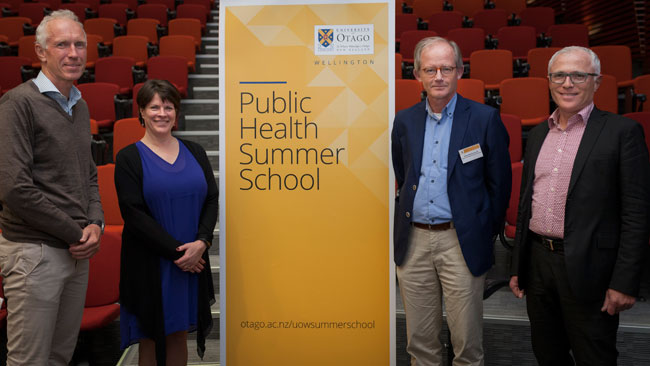 Tuesday 13 December 2016 4:40pm
Tuesday 13 December 2016 4:40pm
From left to right: Professor Alistair Woodward, Vice Chancellor Professor Harlene Hayne, Professor Johan Mackenbach and Professor Michael Baker at the opening in 2016
What has art got to do with public health? How can people be “nudged” to better health using behavioural economics? And what emerging infectious diseases should we really worry about?
Find out the answers to these and other important public health questions at the University of Otago, Wellington's annual Public Health Summer School coming up in February 2017.
“Like public health, art can play an important role in commenting on social issues. The potential of art to support better physical and mental health is not a new idea, however the role of art in supporting the goals of public health has had much less attention,” says Professor Michael Baker, one of the organisers.
The Art and Public Health course features Massey University's Distinguished Professor of Fine Art, Anne Noble, and the 2016 recipient of the Walters Prize, Shannon Te Ao, and will introduce ways in which art and public health intersect, including the role of public art in wellbeing and in creating social space and using art to discuss or disseminate public health issues.
The 2017 Public Health Summer School features an eclectic array of courses ranging from epidemiology and screening to the health of early childhood centres and cities.
“The Summer School is now into its 21st year making it the longest running as well as the largest in the Southern Hemisphere, with a huge range of public health topics,” says Professor Baker.
“This year we're offering 14 new courses, including 'Promoting children's oral health', 'Changing the tobacco supply landscape' and another on 'Fuel poverty, energy vulnerability and injustice',” he says.
These are just some examples of the 30 courses on offer. The Wellington Public Health Summer School typically attracts 700-900 people, looking for high quality, short-format courses provided by expert presenters.
Because most of the courses are one or two days, people can access a few topics of interest, not just one. Last year one international delegate, Dr Hyobum Jang, a Health Leadership Fellow in the Pacific from the World Health Organization, timed his family's holiday to New Zealand especially so that he could attend nine courses over the three weeks of the Summer School.
Along with new topics, the popular core courses, such as Hauora Māori and Pacific Health, statistical methods and public health law, remain on the schedule. Children's health, including confronting children's obesity-promoting environments, will also be a big part of the programme this year.
The courses are presented by international and national leaders in their field. The PHSS will be opened on Tuesday 7 February 2017 with a public lecture by Professor David Heymann from the London School of Hygiene and Tropical Medicine.
“Professor Heymann is amongst the foremost world authorities on emerging infectious diseases,” says Professor Baker.
Professor Heymann has taken a leading role in responses to major global infectious disease outbreaks, including the first recognised Ebola outbreak in 1976 and the SARS epidemic in 2003. He will be the keynote speaker at the emerging infectious diseases course, which will include presentations on such topics as combating antimicrobial resistance, lessons from the Havelock North campylobacteriosis outbreak, and the risk from Zika and other mosquito-borne infections.
On a lighter note, the opening event will feature a 21st birthday cake.
Find out more about the outstanding Public Health 2017 programme.
Early-bird registrations (25% discount) apply until 21 December 2016.
For more information, contact:
Professor Michael Baker
Department of Public Health
University of Otago, Wellington
Tel 64 4 918 6802
Mob 64 21 355 056
Email michael.baker@otago.ac.nz
A list of Otago experts available for media comment is available elsewhere on this website.
Electronic addresses (including email accounts, instant messaging services, or telephone accounts) published on this page are for the sole purpose of contact with the individuals concerned, in their capacity as officers, employees or students of the University of Otago, or their respective organisation. Publication of any such electronic address is not to be taken as consent to receive unsolicited commercial electronic messages by the address holder.
